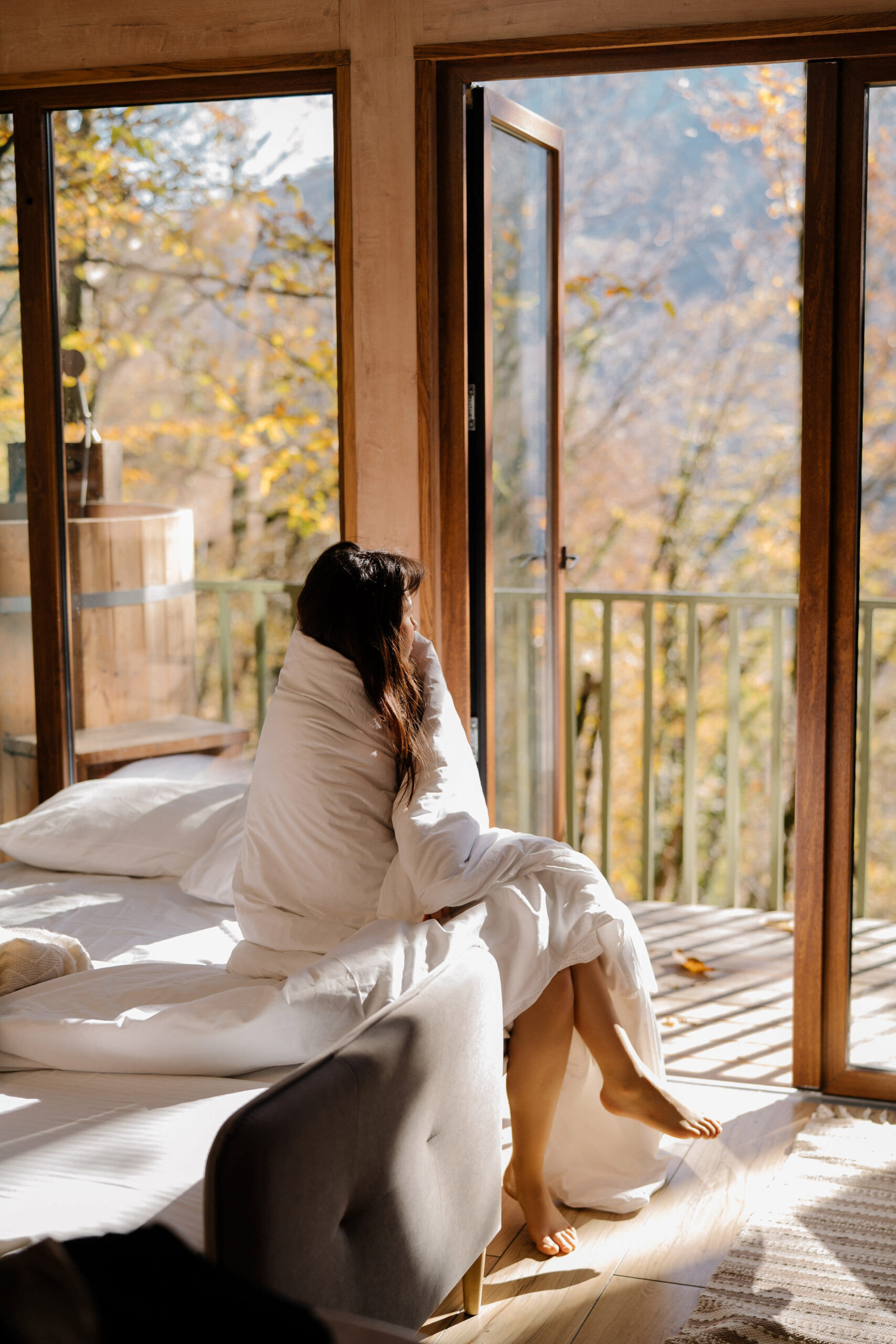
You know that moment when you step outside and the air feels different? Not quite the heavy warmth of summer, but something softer. The light shifts earlier each evening, and there’s a whisper of change in the wind. If you’ve been struggling with your sleep lately—tossing and turning more than usual, or feeling like your usual bedtime routine isn’t working—you’re not alone.
As a psychiatric nurse practitioner who has worked with people navigating sleep challenges for over 15 years, I can tell you that seasonal transitions, especially the shift from summer to fall, create some of the most common sleep disruptions I see in my practice. And here’s what I’ve learned: your body is simply responding to ancient rhythms that modern life often asks us to ignore.
The Wisdom of Seasonal Sleep
Our bodies are designed to ebb and flow with the natural world around us. Throughout human history, we’ve slept differently in summer than in winter, adjusting our rest patterns to match the available light. But now, with our electric lights and climate-controlled homes, we often forget that we’re still deeply connected to these seasonal cycles.
As summer fades into fall, several things happen that can impact your sleep:
Your internal clock shifts. What sleep researchers call our circadian rhythm—that internal timekeeper that regulates when we feel alert and when we feel sleepy—is primarily influenced by light exposure. According to the National Institute of General Medical Sciences, as the days grow shorter and darkness comes earlier, your body begins producing melatonin sooner. This is why you might find yourself feeling drowsy earlier in the evening than you did during those long summer days.
Your nervous system recalibrates. The transition from the active, outward energy of summer to the more inward, settling energy of fall can leave your nervous system trying to find its footing. You might notice feeling more restless at bedtime, or experiencing that “tired but wired” feeling that makes it hard to settle into sleep.
Your body temperature regulation changes. During summer, your body works hard to stay cool, and this affects your sleep temperature patterns. As the weather begins to cool, your body’s natural temperature drop that signals sleep time might feel different, sometimes leading to that frustrating experience of feeling cold when you get into bed but then overheating during the night.
Your Body’s Seasonal Whispers
Have you been experiencing any of these lately?
- Feeling sleepy earlier than usual, but then lying awake once you get to bed
- Waking up more frequently during the night
- That restless feeling in your legs or an overall sense of agitation before sleep
- Difficulty with your usual summer sleep schedule suddenly feeling “off”
- Changes in your appetite or cravings, especially for heartier, warming foods
If you’re human, you probably answered yes to at least one of these. Your body is simply responding to the seasonal shift with the wisdom it has carried for thousands of years.
The truth is, fighting against these natural rhythms often creates more sleep disruption than the seasonal change itself. Instead, what if we worked with these changes?
Gentle Ways to Support Your Seasonal Sleep Transition
Honor your shifting internal clock. Rather than forcing yourself to maintain your summer bedtime schedule, allow your body to guide you toward its new rhythm. If you’re feeling sleepy at 9 PM instead of 10 PM, consider this a gift rather than an inconvenience. Early fall evenings can become a time of gentle transition—perhaps a warm cup of chamomile tea, some quiet reading, or a few minutes of gentle stretching.
Create warmth and coziness. As your body adjusts to cooler temperatures, focus on creating a sleep environment that feels nurturing. Research from the Sleep Foundation shows that optimal sleep temperature typically ranges between 60-67°F (15.6-19.4°C). This might mean layering your blankets so you can adjust throughout the night, wearing comfortable sleepwear that you can easily remove if you get too warm, or keeping a light sweater by your bed for those middle-of-the-night temperature fluctuations.
Embrace the earlier darkness. Instead of flooding your home with bright lights the moment the sun sets, try dimming your lights gradually in the evening. This supports your body’s natural melatonin production. Candles, soft lamps, and warm-toned light bulbs can help create an atmosphere that whispers “rest” rather than “stay alert.”
Support your nervous system. This transitional time can benefit from extra nervous system support. The American Psychological Association notes that relaxation techniques can significantly improve sleep quality. Gentle evening yoga stretches, a few minutes of deep breathing, or even a warm bath with Epsom salts can help your body transition from the day’s activities to nighttime rest.
Listen to your body’s hunger cues. As the seasons shift, you might find yourself craving different foods. This is normal. Your body may be asking for more grounding, warming foods that support steady energy throughout the day and restful sleep at night. According to Harvard Health Publishing, what and when we eat can significantly impact sleep quality. A light, nourishing dinner a few hours before bed—perhaps some warm soup or roasted vegetables—can support better sleep than the lighter summer fare your body was asking for just a few weeks ago.
There Is Wisdom in Working With, Not Against, Your Body
Here’s something I’ve observed in my practice: people who fight against their body’s seasonal wisdom often experience more sleep disruption and anxiety than those who learn to flow with these natural changes. Your body isn’t betraying you by wanting to sleep earlier or needing different foods—it’s responding to information that goes back to our earliest ancestors.
This doesn’t mean you have to completely overhaul your life every time the seasons change. Small, gentle adjustments—a slightly earlier bedtime, warmer sleepwear, or a cup of herbal tea in the evening—can make a significant difference in how smoothly you navigate these transitions.
And remember: this is perfectly normal. You’re not broken if your summer sleep routine isn’t working as well in early fall. You’re human, connected to rhythms much larger than yourself.
Your Sleep Deserves This Attention
If you’ve been struggling with sleep changes as the seasons shift, know that you don’t have to navigate this alone. Quality sleep isn’t a luxury—it’s the foundation for your physical health, emotional wellbeing, and mental clarity. It affects everything from your immune system to your ability to handle stress, from your memory to your relationships.
Many of us have been told that sleep problems are just “part of getting older” or that we should simply accept disrupted rest as normal. I can tell you from my years of practice: this is not true. With the right understanding and gentle, holistic approaches, you can reclaim the restorative sleep your body and mind deserve.
That’s why I’m developing “Sweet Dreams After 60″—a comprehensive program that addresses not just the mechanics of good sleep hygiene, but the deeper rhythms, seasonal changes, and whole-person approaches that can transform your relationship with rest.
If you are a woman over 60 and this speaks to you, I invite you to join the waitlist for this program. You’ll be the first to know when it becomes available, and you’ll receive gentle guidance and insights about sleep in the meantime. Because everyone deserves nights of deep, restorative sleep and mornings of feeling truly rested. Click below to learn more.
Until then, be gentle with yourself as the seasons change. Your body’s wisdom is ancient and trustworthy. Sometimes the most profound healing happens when we learn to listen to what it’s been trying to tell us all along.
Sweet dreams,
Inge
P.S. If you’re experiencing persistent sleep difficulties that significantly impact your daily life, it’s always wise to consult with your healthcare provider to rule out any underlying medical conditions.
You may also like:
How Seasonal Transitions Affect Your Sleep (And What You Can Do About It)
September 18, 2025
meet inge
I’m Inge, a Psychiatric Nurse Practitioner passionate about helping others feel grounded, resilient, and well. Here on the blog, I share insights on mental health, prevention, meditation, clean skincare, and nutrition—everything I turn to in my own daily life. I hope this space becomes a trusted part of your wellness journey.
LATEST FROM THE BLOG

I had a friend tell me something last week that stopped me in my tracks. She said, “I feel like I’m drowning in other people’s thoughts.” She’s 67, retired from teaching, and spends hours each day scrolling through news apps, checking Facebook, watching YouTube videos about gardening (her passion), and texting with her grandchildren. All […]


When Your Body Remembers What Your Mind Tries to Forget Have you ever noticed how grief settles into your shoulders? How anxiety lives in your chest like a bird that won’t stop fluttering? Or how years of unspoken words seem to tighten around your throat? If you’re nodding right now, you’re not imagining things. Your […]

Postmenopausal women often face unique challenges, one of the most pervasive being insomnia. As hormonal shifts disrupt sleep patterns, sleepless nights can become all too familiar, leading to daytime fatigue and a decline in overall well-being. But rest assured, effective strategies exist to reclaim restful nights. By understanding the underlying factors contributing to insomnia, from […]

You’ve learned about breathing techniques, herbs, exercise, self-compassion, and creating a calm environment. Each of these tools can help reduce anxiety. But how do you put them all together into a sustainable system that actually works in your daily life? That’s where an anxiety management plan comes in. An anxiety management plan isn’t about adding […]